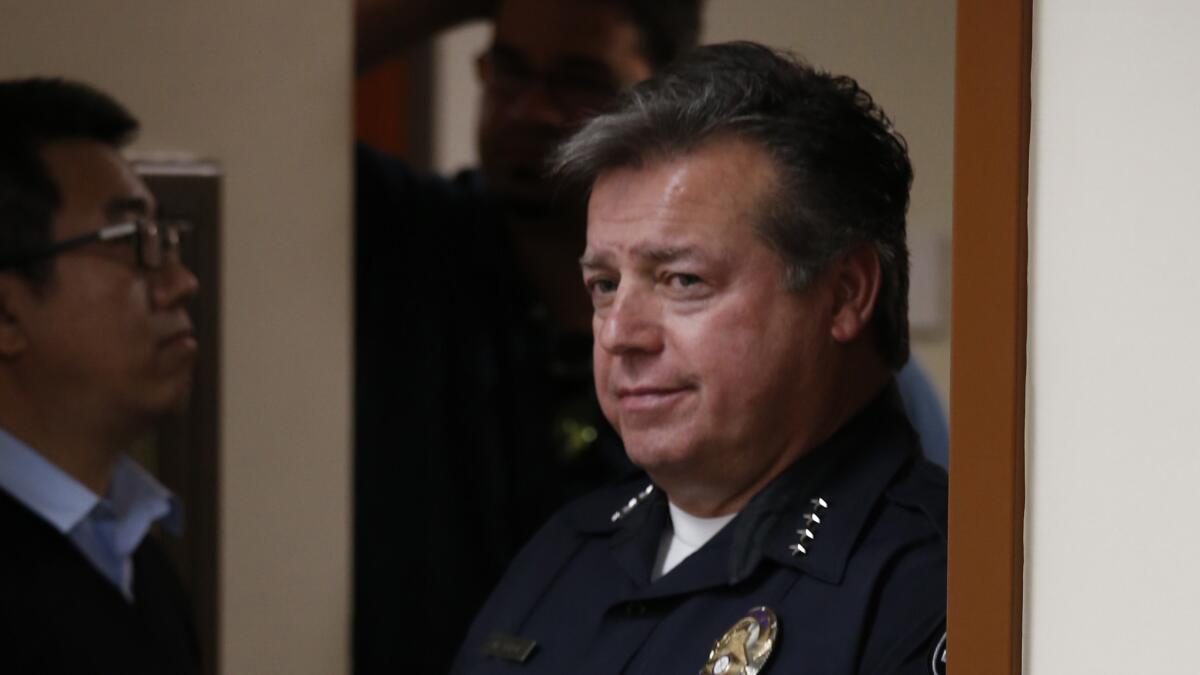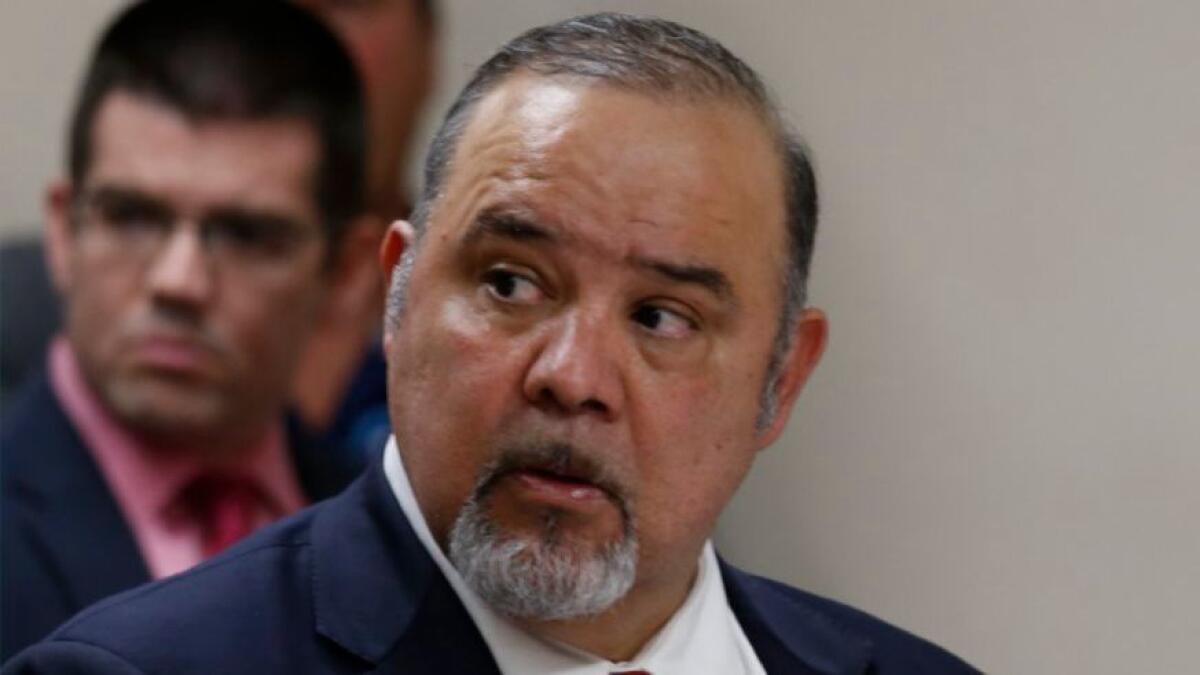This police chief can only be fired if he commits a crime. It has to be a felony

- Share via
When Baldwin Park rehired Michael Taylor as its police chief, the city included a provision in his contract that makes him exceedingly difficult to fire.
Taylor can only be terminated from his $234,000-a-year job, according to the agreement, if he commits a felony.
Baldwin Park leaders also prohibited themselves from giving Taylor annual performance evaluations. The agreement allows the council to place Taylor on administrative leave — but with pay.
The City Council approved the unusual contract in November.
The contract term is only for one year. But if the council doesn’t renew it, Taylor gets a severance package worth three months’ salary.
Experts in municipal government said they’ve never heard of a contract that sets committing a felony as the bar for terminating a public official.
“If the only reason you can be fired is a felony then what prevents you from working half days or doing much of anything?” said Michael Jenkins, adjunct professor of local government law at USC. “Protecting him from being terminated for any malfeasance besides a felony is a really high bar.”
Document
Taylor cannot be terminated during the term of his employment except for the commission of a felony. Taylor can be placed on administrative leave with pay at any time by the City Council.
see the documentSome city council members defended the contract, saying they wanted to bring stability to the department after a period of frequent turnover. The previous chief, David Salcedo, was fired just weeks into the job. Taylor was the chief before Salcedo but was fired in September 2016 and forced into retirement. The council votes by the five-member body for Taylor’s first firing, Salcedo’s firing and Taylor’s rehiring were split at 3-2. Taylor had faced accusations of racism, according to some council members.
Mayor Manuel Lozano voted to fire Taylor and then voted to bring him back. He said he was looking for a “new vision” for the city when he decided to oust Taylor, but then voted for the contract to give the city some tranquility before it embarked on yet another search for a new chief.
Taylor had asked for ironclad protection from being fired short of committing a felony as a kind of “safety net” after the position underwent so much turnover, Lozano said.
Taylor declined to comment.

Taylor was recently elected board member at West Valley Water District in Rialto, about 39 miles from Baldwin Park, soon after returning as police chief.
One of Taylor’s first actions as a new director on Dec. 7 was to vote for a new attorney to serve the district: Robert Tafoya, the Baldwin Park city attorney who weeks earlier presented the chief’s employment contract to that city’s council for approval.
Tafoya had done work for the district before. Taylor made the motion at the district board meeting to hire him back.
Bob Stern, a good-government expert, said the way Taylor was hired and then played a role as a West Valley Water District director in getting Tafoya hired raises serious questions.
“He should not have participated in that vote after the contract. It’s just too close to the awarding of the contract,” Stern said. Taylor’s deal “seems like a sweetheart contract. It’s too cute... and clearly they thought nobody’s going to notice.”
The water district has also experienced tumult. A board meeting this week erupted into chaos when the board met to fire several executives at the agency. Attendees in the audience shouted comparisons to Bell, the small southeast L.A. County city infamous for its corruption scandal, and claimed they were being retaliated against for blowing the whistle on corrupt practices by the board president.
Baldwin Park council members reached by the Times said they didn’t know Taylor had chosen Tafoya to be West Valley’s attorney. But they said they were not concerned about it.
“I trust both of these individuals. They’re ethical and above board,” Lozano said.

‘Not just a felony.’
Baldwin Park council members gave several reasons for Taylor’s unusual contract.
When Taylor first retired he received a pension of about $177,800, according to a spokeswoman for CalPERS, the California Public Employees’ Retirement System. Returning as police chief came with a $234,000 salary. He would not collect his pension while working as chief.
But once he retires again, his pension will likely rise. Assuming that Taylor’s pension is calculated on a retirement formula provided by CalPERS, Taylor’s new pension would well exceed $200,000 annually.
Taylor wanted the provision that bars firing him short of a felony because the chief was concerned about reverting back to a lower pension if the council fired him before his contract was up, according to Councilman Ricardo Pacheco.
Pacheco also said the council strife over the position had scared off good candidates.
Councilwoman Monica Garcia said that before his contract was approved, Taylor was being paid hourly, racking up bills and collecting his pension at the same time. Over the course of a few months, he had received more than $100,000 in pay, she said. With the contract, Taylor would be paid less, she said.
Councilwoman Cruz Baca, who voted against the contract, expressed concerns about the city’s financial position during the Nov. 15 council meeting. Councilwoman Susan Rubio also voted no and said she was troubled by eliminating the possibility of terminating the chief “at will.”
Experts say its hard to fathom a scenario where a city would hire someone for such an important post under conditions that require him or her to commit felony crimes to be fired.
Jenkins, the local government expert at USC, said one possible circumstance would be to hire an official for a finite period of time who needs to be insulated from politics in order to root out a specific problem. He referenced Robert Mueller, the special counsel investigating President Trump’s 2016 campaign and its possible ties to Russia.
Still, experts say it would be hard to find another deal like Taylor’s.
“There are times when city councils may elect to do something that’s unusual to ensure stability in the organization and they find that to be an important basis for giving such a generous contract,” said Edward Medrano, president of the California Police Chiefs Assn. “Most employment contracts have more provisions to hold employees accountable. Not just a felony.”
Sign up for Essential California
The most important California stories and recommendations in your inbox every morning.
You may occasionally receive promotional content from the Los Angeles Times.









